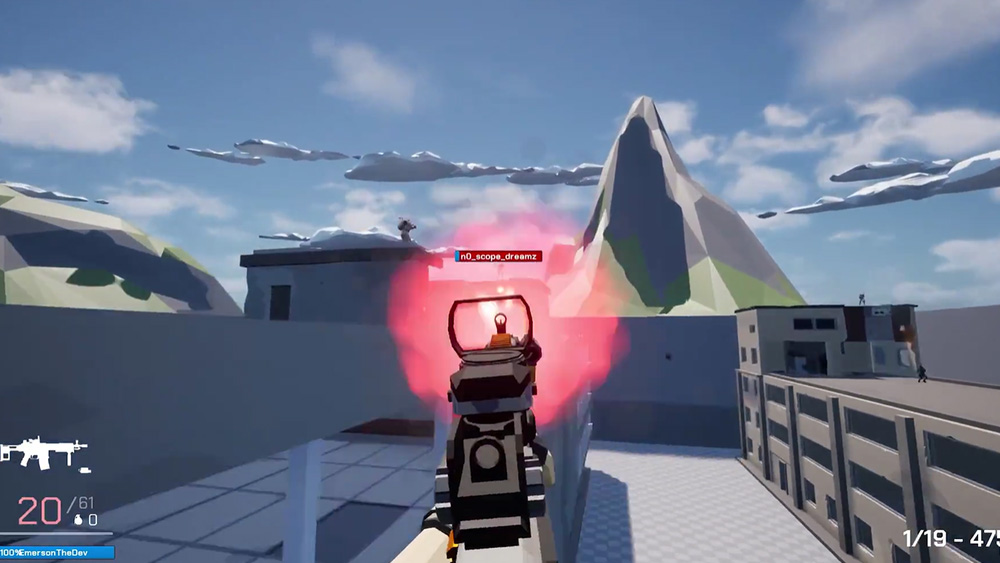“There are no rules and no planning: just organic, true doodling,” says Mr Doodle as he launches major exhibition
The internet's favourite doodler comes to Bath.
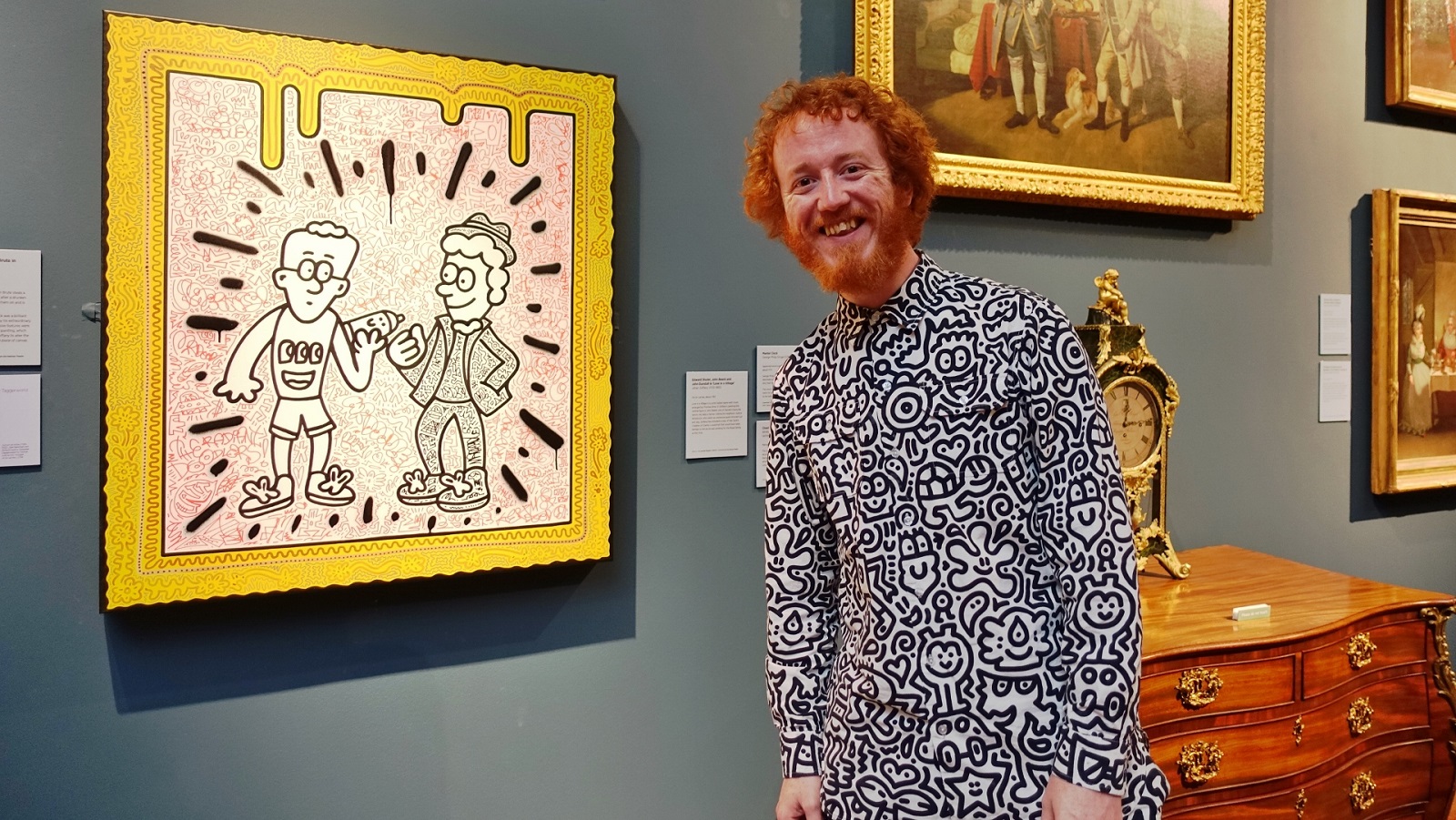
You don’t have to spend much time online to come across work by Mr Doodle and, once you’ve got to know his graphic style, which he calls “graffiti spaghetti”, you’ll notice it popping up everywhere. Maybe you read about him covering an entire house in stark black and white doodles (yes, both inside and out), or you saw his collaborations with Converse, Fendi, Puma and Red Bull. Or perhaps you're one of his millions of social media followers. Mr Doodle (real name Sam Cox) has come a long way from the art student at the University of the West of England who would doodle on his clothes. At just 30 years old, he's exhibited worldwide and turned the simple art of doodling into his imaginary world of DoodleLand.
However you came to know him, you’re welcome at his first ever UK exhibition, Mr Doodle: Museum Mayhem!, which takes over the historic Holburne Museum, in Bath, until 1 September 2024. Spaces from the entrance hall to the staircase and the Andrew Brownsword Gallery get the Doodleland treatment, covered with motifs like flowers, creatures, coral-like squiggles, spray cans, and people moving, all enveloping you in the space. Mr Doodle has also taken his trademark doodles to parts of Bath city centre.
We sat down with Mr Doodle (who was wearing his trademark doodle-covered shirt, trousers and shoes) to talk materials, internet comments, and mental health as an artist.
Has your creative process changed much over the years? And how much planning goes into what you do?
I’m inspired by new things, new mediums, but the core concept has stayed consistent: it has to be organic; I just see what happens. There are no rules, and there’s no real planning - 95% of what I do is just organic, true doodling, filling a certain space.
When I’m using black and white, it’s just about the contrast, but when I add colour, I use my instincts to think what would work – reds and blues can have a certain feeling. But I don’t put a sense of meaning or symbolism into the colours as such, it’s just what I think will work instinctively. The only difference for this exhibition was when I responded to paintings in the Holburne collection and looked at the colours included in those paintings as a starting point.
Which medium do you use for the doodles – is it pens or paint?
I use paint-filled squeezer markers, which are really designed for graffiti artists doing tags; they’re made to drip a little bit, and they make naturally thick, blotchy lines, but I usually control the lines. I don’t mind when the markers drip a bit, though – it happens organically.
The only difficult part in this exhibition was when I was working in the dome part of the museum, and had to be on top of scaffolding to reach the ceiling. When the paint markers are used upside down, they don’t work as well, so I had to keep blotting them on paper.
Apart from the paint markers, two of the paintings in this show have spray paint. I also used emulsion for the backdrops on the canvases and applied it with a paint roller.
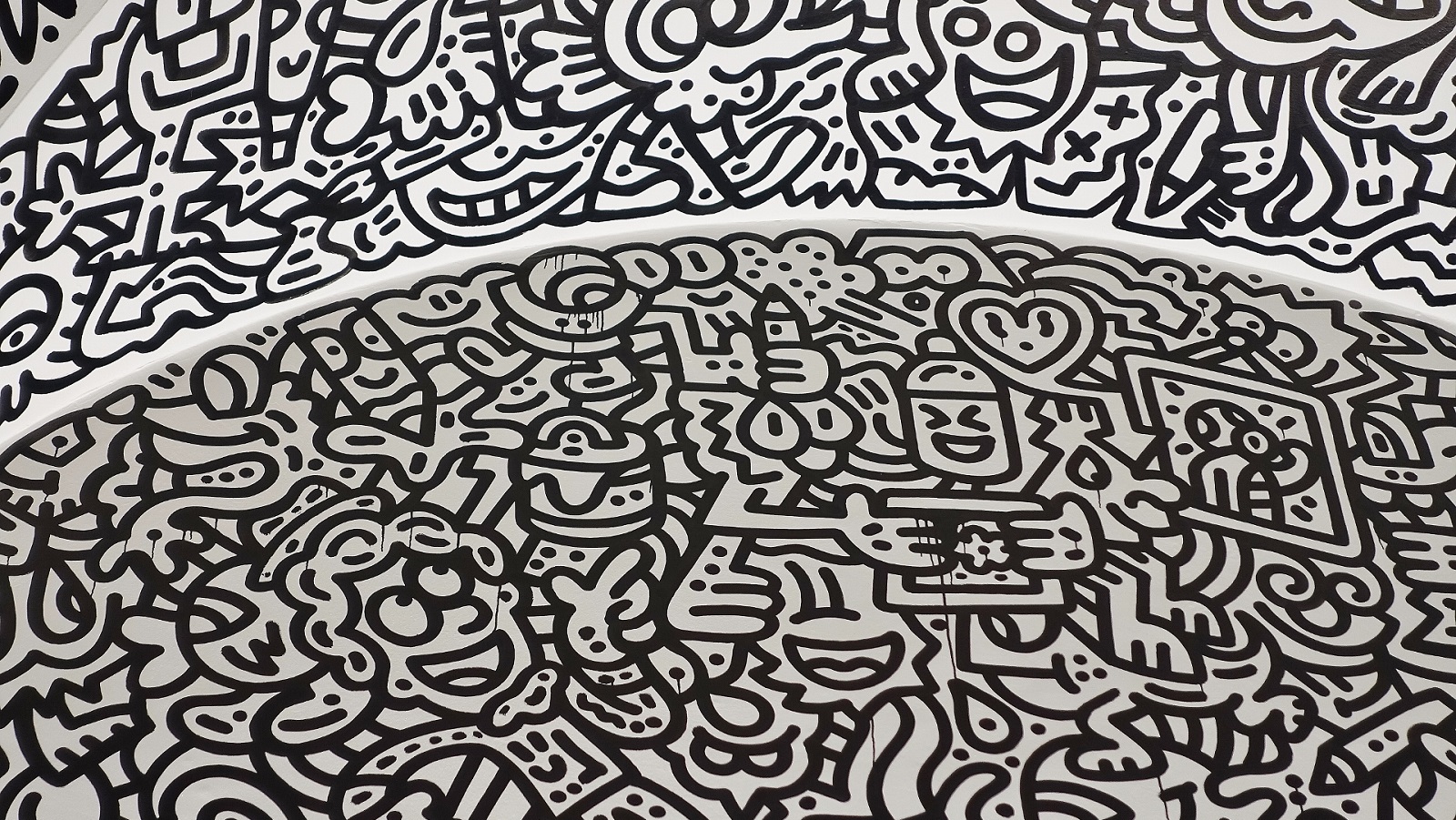
For this exhibition, you’ve taken over the museum as well as made your mark on the city centre. What’s it been like to have these different canvases?
I chose which paintings I’d respond in the collection, and it gave me a new appreciation for them. I wanted it to be really immersive for people, so you see the original and then my version with the frames painted on. For one of the pieces, I used coloured pencil for a background section so that it mirrored the unfinished painting it was based on. That was something new for me.
Outside the museum, I found the city responded really well, even though they’ve been taken over by me! Kids and adults are talking about it, taking photos, and embracing it.
What’s been your favourite brand collaboration, and also your favourite artist to work with?
Fendi was really cool to work with – taking the idea of doodling to a high-end brand and another level [this collaboration involved a takeover of Fendi’s rooftop in Rome and, later, a capsule collection for Chinese Valentine’s Day]. It raises how people perceive this kind of art: they often see doodling as throwaway, but not when it’s on a Fendi bag. I like seeing where that takes them to.
My favourite artistic collaboration was with LA2, whose work I love. We collaborated in New York City [on a mural at Modern Haus Soho, above], and he has a similar thing for patterns and subconscious drawing. In terms of collaborations, I’d work with most people, but I don’t have an ideal person or brand I really want to work with. Right now, I’d say my best collaborator is my 11-month-old son – I love doodling with him and seeing his scribbles.
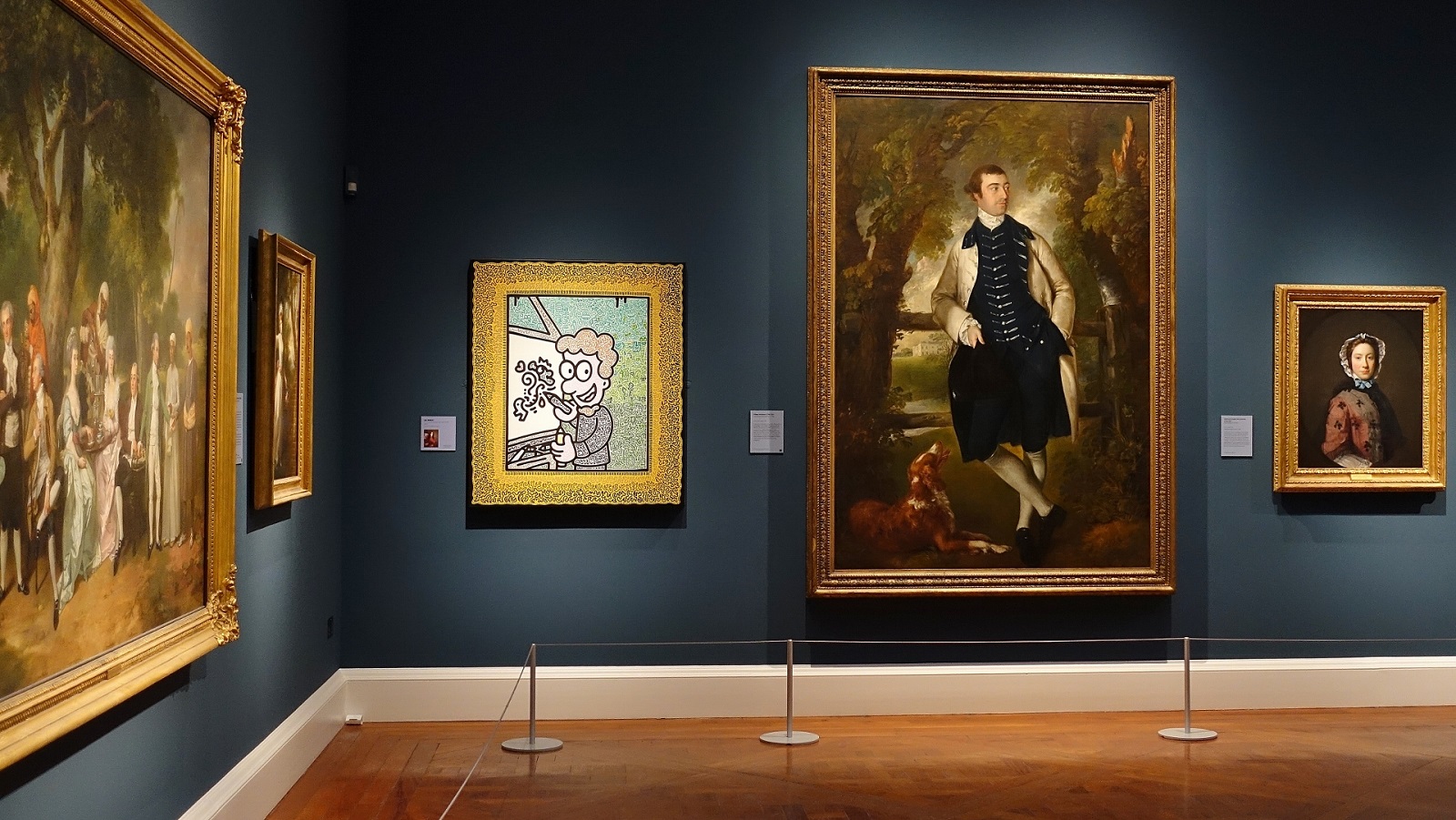
How do you deal with the positive and negative aspects of being visible on the internet?
I like all the comments I get online, even the negative ones, because they can be quite interesting or sometimes really funny. I make happy doodles, it’s not confrontational art, but sometimes they read things into it.
Whatever the comments are, they mean people are talking about what I do, and I know that not everyone will get it. That’s fine by me. Sometimes people do change their mind, but not always. If my doodling really upsets them, I wish them well.
You’ve been open about your experience of psychosis a few years ago. Do you have any advice for those struggling with their mental health in our industry?
Part of my mental health episode was related to art; it was a short, intense psychotic episode out of nowhere, and I was seeing things and hearing things that weren’t there. Despite this, doodling definitely helped with my recovery, so I’d recommend that. When you make time for creative expression, it releases something, even if you’re not happy with the result.
For anyone dealing with mental health, it’s important to take each day as it comes, and break down tasks into smaller chunks. I’d also recommend working with others, listening to music, and watching TV. Lastly, trust that your family and friends will support you.
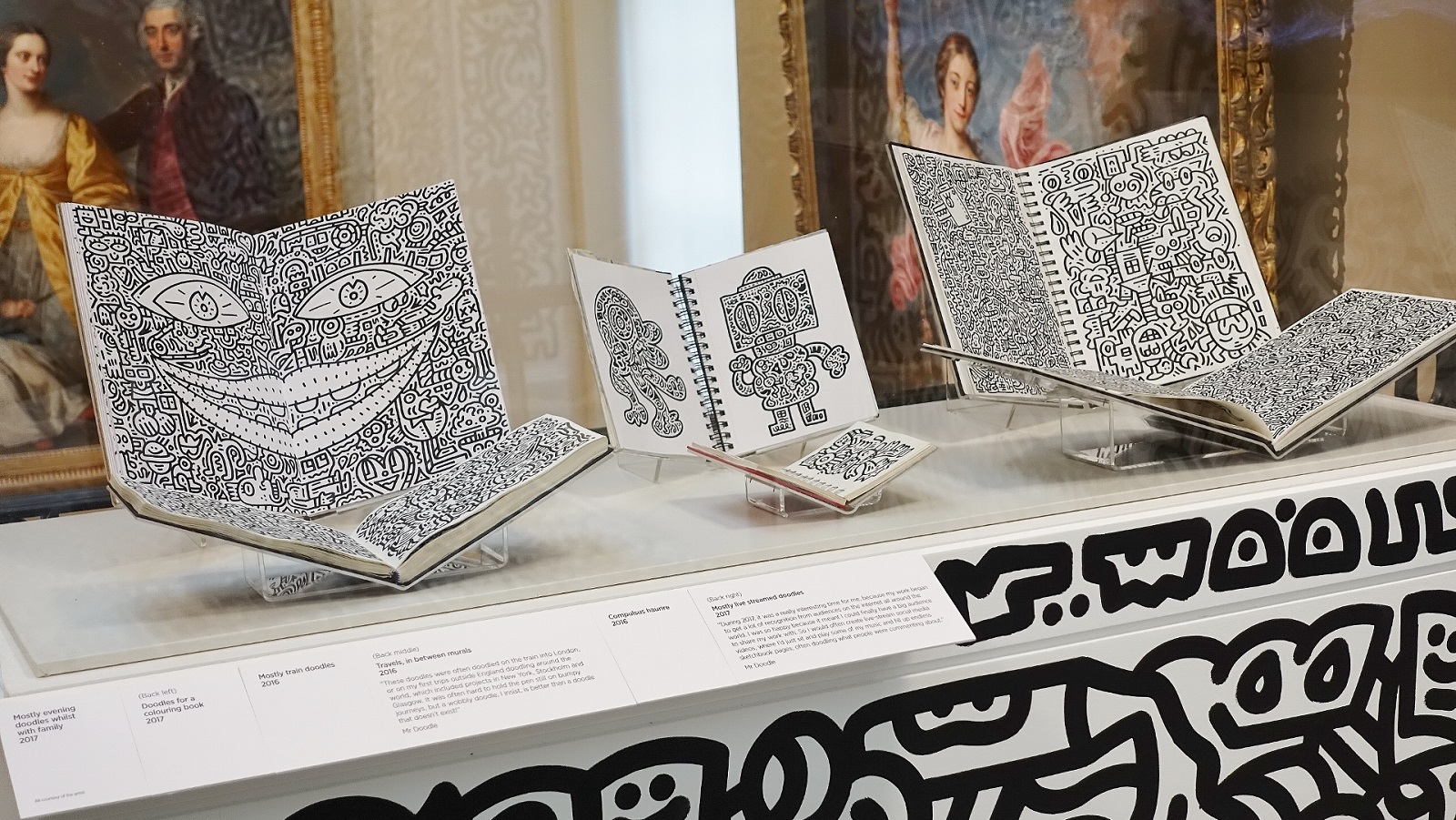
Lastly, do you have any dream projects you’d like to do in the future?
What’s next for me? It’s not about setting goals or aims in case they don’t happen; instead of that, I just like having project ideas and seeing what comes of them. It has to be organic. One of my big project ideas is to doodle an entire town – I’d love to do that.
Mr Doodle: Museum Mayhem! is at the Holburne Museum in Bath, Somerset, until 1 September 2024. Also watch out for Mr Doddle's documentary: The Trouble with Mr. Doodle.
Get the Creative Bloq Newsletter
Daily design news, reviews, how-tos and more, as picked by the editors.

Thank you for reading 5 articles this month* Join now for unlimited access
Enjoy your first month for just £1 / $1 / €1
*Read 5 free articles per month without a subscription

Join now for unlimited access
Try first month for just £1 / $1 / €1
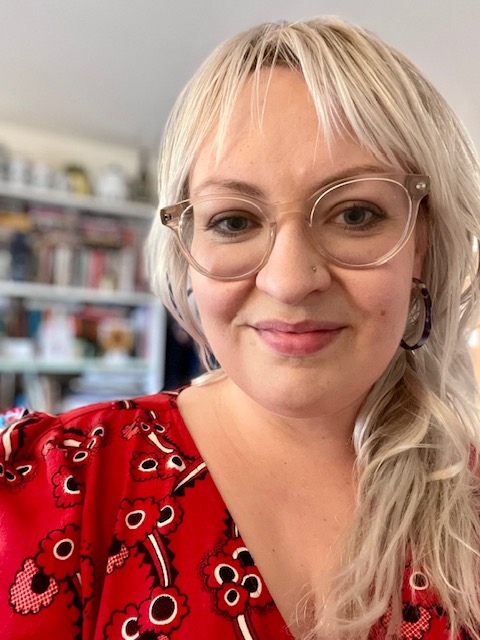
Polly Allen is a freelance journalist and marketer based in Bristol. She specialises in travel and lifestyle journalism, including art reviews. As a marketer, she has worked for the charity sector, the travel industry, the museum sector, and healthcare organisations.
